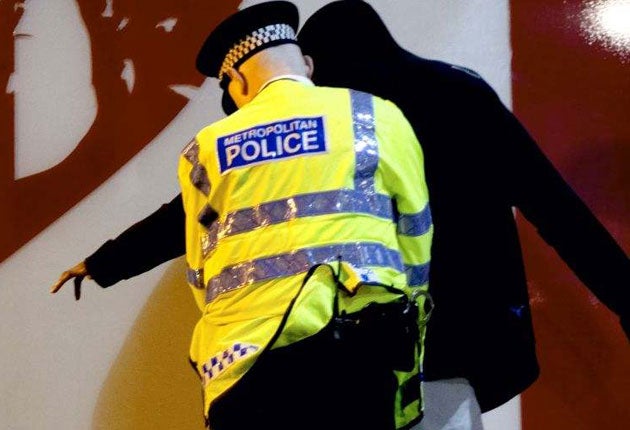101,000 stop and searches. No terror arrests
Heavy-handed police tactics have harmed race relations, human rights groups warn

Not one person stopped and searched under anti-terrorism powers in Britain was arrested for terrorism-related offences last year, the Government's own figures show.
The alarmingly high use of random searches is more evidence of heavy-handed policing which will alienate all communities, human rights groups said yesterday.
The Home Office statistics also revealed that no terror suspects had been held in custody before charge for longer than 14 days since 2007. In all, 101,248 people were stopped and searched in England, Wales and Scotland under Section 44 of the Terrorism Act, which does not require a police officer to have reasonable suspicion that an offence might have been committed.
Of the 506 arrests that resulted, none were terrorism-related. Since July, police are not allowed to stop and search people unless they "reasonably suspect" them of being a terrorist.
Of all the searches, four out of five were made in the Metropolitan Police area, with almost a fifth being made by British Transport Police. Shami Chakrabarti, director of the civil rights group Liberty, said the statistics highlighted what a "crude and blunt instrument" stop and search had been. "It costs us dearly in race equality and consent-based policing with very little return in terms of enhanced security," she added.
Overall, 59 per cent of the people stopped described themselves as white, 17 per cent as Asian or Asian British, 10 per cent as black or black British and 2 per cent as of mixed ethnicity, the figures showed. The use of stop and search powers fell by 60 per cent compared with 2008-09.
Detention and stop and search powers are being looked at as part of a review of the Government's counter-terrorism policy by the Liberal Democrat peer Lord Ken Macdonald, whose findings are to be published shortly.
The former shadow home secretary David Davis said the figures showed "what a massively counter-productive policy this is". He added: "A policy which fuels resentment and antagonism amongst minority communities without achieving a single terrorist conviction serves only to help our enemies and increase the terrorism threat."
Massoud Shadjareh, chairman of the Islamic Human Rights Commission, said it was clear that some ethnic groups were still being disproportionately targeted and that the powers were "irrelevant and useless, as well as a waste of money and resources".
But the Policing and Criminal Justice minister, Nick Herbert, said: "The [terrorism] threat to the UK remains at severe. I commend the hard work of the police, the agencies and the CPS in foiling those who would do us harm and in bringing them to justice.
"The Government is committed to ensuring that all counter terrorism powers are used proportionately and the Counter Terrorism Review will report back shortly."
